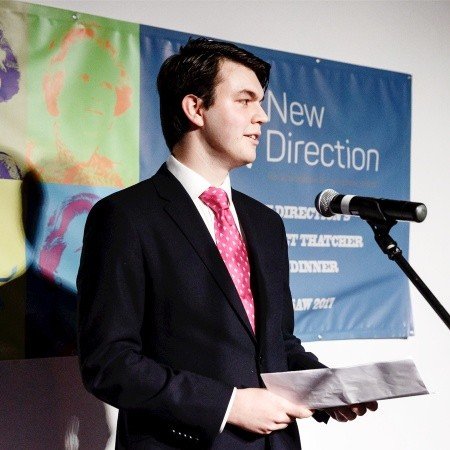
Removing the last of the Iron Curtain
Robert Tyler, Senior Policy Director at Brussels-based think tank New Direction
Churchill’s famous ‘Sinews of Peace’ speech, given at Westminster College in Missouri in 1946, came against the backdrop of a changing global order. The World was recovering from the horrors of the Second World War, and had emerged into a fragile peace. Many lived in the naïve hope that major conflicts were now to be a thing of the past, and the advent of international institutions such as the United Nations, World Bank, and IMF would secure a new age of cooperation for prosperity. Early signs of the coming Cold War were however already beginning to emerge.
In 1944 – the Anglo-Austrian Economist Frederick von Hayek had published his seminal work, ‘The Road to Serfdom’, warning about the dangers of totalitarian collectivism. His book had been inspired by his observations of the direction of travel of the Soviet Union, and its clear imperialistic ambitions for the spread of communism. Hayek warned that international institutions would have to be protected from hostile infiltration, and that the liberal world order, by the virtue of its own liberal ideas, would be under threat from those who didn’t seek to follow the rules.
A year later, the British author George Orwell published his novel ‘Animal Farm’, a character study of the expansionist nature of the leadership of the Soviet Union. Orwell expanded this thinking further in an essay in the same year where he popularised the phrase ‘Cold War’ in outlining the new ideological threat.
A mere month before Churchill’s speech, in February of 1946, George F Kennan – then serving as deputy head of mission in Moscow – wrote his infamous ‘Long Telegram’ in which he set out for American leadership the true nature of the Communist regime at the heart of the Soviet Union – and their ambitions to build a repressive sphere of influence.
All three men had been seen as outcasts – considered cranks who were trying to break the relationship with the Soviet Union. To many in the establishment, the USSR was a reliable ally that had helped defeat Nazism.
It would spur a change in Western thinking about the Soviet Union – and those states that live under it. Churchill’s line about an ‘Iron Curtain’ descending across Europe perhaps had the most profound impact with it opening the imaginations of policy makers in the West. It was realised that so called ‘Captive Nations’ would need Western support going forwards.
In 1959 the ‘National Captive Nations Committee’ was established in the United States, with the aim of restoring the freedom and independence of nations under the yolk of Communist tyranny. President Eisenhower declared ‘Captive Nations Week’ – a week dedicated to the plight of Poland, Czechia, the Baltic States, and other nations under Communism.
Today we could yet still learn from this approach – many national groups remain trapped by both Russia and China, victims of ethnic cleansing, discrimination, and oppression. More than 3 million Uyghurs have been interned in camps in China, their native language banned, their faith forbidden, and their culture destroyed.
In Kalmykia, Chechnya, Dagestan, Circassia, Chuvashia, Bashkortostan, and other ‘Republics’ across the Russian Federation, indigenous people are being conscripted to fight Moscow’s war in Ukraine. At home, those who protest are harassed by the FSB, whilst their languages are outlawed, and their places of worship demolished.
Those who try to leave their homes to find work in other parts of Russia are subjected to racial discrimination by Russian authorities.
There now exists a new opportunity for the United States and the United Kingdom to work together in supporting the rights of these groups of people – as they did during the Cold War. In Washington and London, cultural centres supported by the respective governments kept alive the languages, traditions, and identities of those who were repressed by the Soviet Union – the same could be done again today.
It would spur a change in Western thinking about the Soviet Union – and those states that live under it.
Equally, the Transatlantic community should take seriously the prospect of collapse in some of these regions in the aftermath of the Ukraine war. In the 1990’s the West was caught off guard by the independence of many nations in Central Asia, and so they fell back into the orbit of Russia, and latterly China. The Transatlantic community must not make the same mistake twice, and support burgeoning nations in Central Asia in their desire to be free.
The West should set itself the aim of removing the last of the Iron Curtains – and speak up for those in Central Asia without a voice.

